Where We Belong
The war and the years since had changed Trevor, but not how he felt about Violette.
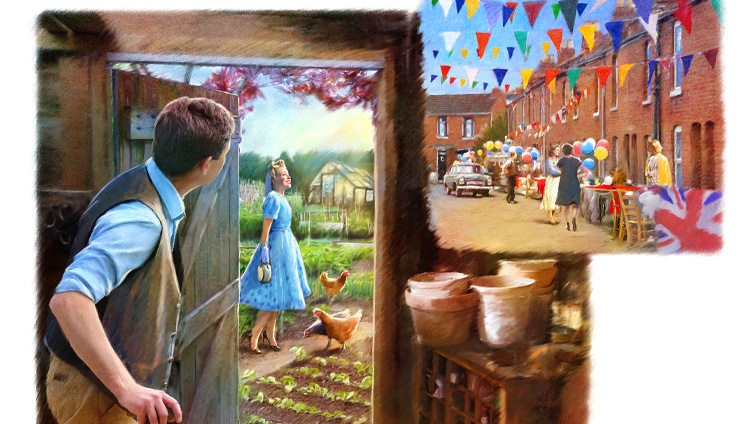
Illustration: David Young.
Subscribe to The People’s Friend! Click here
The war and the years since had changed Trevor, but not how he felt about Violette.

Illustration: David Young.
HISTORICAL SHORT STORY BY TERESA ASHBY.
In this story, set in 1953, The war and the years since had changed Trevor, but not how he felt about Violette.
Hello, Jerry! You look busy. Is Trevor about?” “Saw him earlier,” Jerry replied. “I haven’t seen him leave.”
Trevor straightened up. He knew that voice.
He could see the top of Violette’s scarf bobbing in his direction over the fruit bushes.
He plunged his fork into the ground and bolted towards his shed, shutting himself inside at the very moment she arrived at his allotment.
“Yoo hoo, Trevor!” she called. “Are you about?” She knocked on the door. “Are you in there, Trevor? It’s me, Violette.”
He held his breath. This was ridiculous! He’d been captured during the war, but here he was hiding from a young woman!
She tried the door, but he held tight to the other side and she couldn’t budge it.
Violette was a beautiful woman with naturally curly blonde hair and big blue eyes – and she scared Trevor to death.
He was about to open the door a crack when he turned to the little window at the side.
It was grimy with pots piled up in front of it, but he could see those piercing blue eyes looking in.
“What are you hiding from in there, Trevor?” Violette said.
He opened the door and swung it back and forth a few times, then checked the hinges.
“That’s fixed it. Sorry, Violette, didn’t you hear me say I’d be out in a minute? What can I do for you?”
“Can you volunteer to help out at the street party?” she said.
“Oh, street parties aren’t really my thing,” he said.
But it’s the Coronation
Violette said. “It could be a once in a lifetime thing for us.
“Well, I hope it is. I hope that our lovely young Queen lives for a very long time.”
He heaved a sigh.
“I don’t see there’s a lot I can do,” he said.
“There’s plenty you can do, Trevor Robinson. There are tables to be set up, chairs to be carried and bunting to be hung.
“We’re going to make an early start on Tuesday. I’ll expect to see you there. Go on, Trevor, it’ll be a laugh.”
“Yes, Violette,” he said.
“Don’t look so glum. There’ll be lots of food and drink and the celebrations will go on into the evening.
“You can come round ours and watch it on the television with your parents if you like.”
“You’ve got a television?”
“Dad’s rented one just for the Coronation, but I don’t reckon he’ll be sending it back somehow.”
Trevor watched Violette go. She paused for a while to talk to his hens, and before disappearing, she whipped off her scarf and turned her beautiful face up to the sun.
He took up his fork and began to attack the soggy soil while his hens bustled about the allotment, pecking at this and that.
Trevor had been eighteen when the war started, and Violette was just a little girl of fourteen who lived next door to his parents.
Before he went away, she used to trail round behind him, asking him never-ending questions and sticking to him like glue.
He didn’t mind at all and he enjoyed her company, except when he saw his friends and he’d ask her to run along, which she always did.
“I think young Violette’s sweet on you, Trevor,” his mother said with a chuckle.
“She’s just a kid,” he’d replied.
“And growing up fast,” his dad put in.
Will you write to me, Trevor?
Violette asked, the day he went away.
“I don’t think I’ll have time,” he replied. “I’ve already promised to write to Mum and Dad and my grandparents.”
Besides, he’d feel such a fool writing to a girl her age, and he’d already promised to write to some older girls who had begged him to keep in touch.
He’d been so different then, so full of confidence and swagger.
The war had knocked that out of him. Gradually the letters had stopped coming from the other girls and he’d wished he’d agreed to write to Violette because he missed her company more than anything.
Next time he went home, Violette had gone.
Her mother had taken her and her brothers to stay with an aunt who lived on a remote farm in Yorkshire.
Trevor had been disappointed, but he’d understood why they’d want their family to be somewhere safer.
She was almost twenty-one by the time he saw her again and he hadn’t recognised her at first.
All he was aware of was the pounding of his heart.
“You remember Violette, don’t you, Trevor?” his mother said.
He’d been struck dumb.
Violette had flung her arms around him.
It seemed that beneath that stunning beauty, she was the same old Violette, down to earth and as demonstrative as ever.
He’d stood there like a statue, arms at his sides, and he’d seen the hurt in her eyes when she pulled back.
He struggled to make sense of the feelings overwhelming him.
“You’ve grown,” he said at last, talking as if to a child.
“Well, I’m not a child any more,” she’d said, tilting her chin proudly.
It didn’t take him long to realise that she was as outgoing and friendly with everyone. The whole town loved Violette.
She could charm the grumpiest old man out of a bad mood or the noisiest child from a tantrum.
She was like a ray of sunshine, taking her warmth wherever she went.
She was twenty-eight years old now and still single. Trevor couldn’t understand why she hadn’t been snapped up.
It wasn’t Violette that frightened him, but his feelings for her.
Trevor stopped digging and wiped his arm across his forehead.
This was his dad’s allotment, but he’d taken it over when he came back from the war.
Somehow he’d found peace with himself in this quiet spot, watching things he’d planted grow and spending time with the hens. One of them had stopped laying, but Trevor didn’t let on to his dad.
He was very fond of Vera and couldn’t bear to think of her ending up as Sunday dinner.
She was the hen that would come over and sit with him when he stopped for his lunch, cooing softly until he gave her a few crumbs of bread.
The others would gather round then and he’d laugh because only Vera was polite enough to ask.
He spent all day at the allotment and before going home, he secured the hens in their coop, checked he’d put all his tools in his shed and set off.
“Violette tells me you’ve agreed to help out with the party,” his mother said.
“Did she?” He grinned.
“I was thinking,” Ellen went on, “that I could make some chicken sandwiches.”
“Oh, I think the children would prefer jam or egg.”
“For the adults,” Ellen said. “I could roast the old hen and use the meat.”
“What old hen?”
“The brown one.”
“She’s gone,” Trevor said, horrified at how easily he lied to his own mother. “Didn’t I tell you? I think a fox took her.”
“Oh. Well, one of the others, then. You choose. Bring it home tomorrow and I’ll cook it on Monday ready for Tuesday.”
In the morning, Trevor popped up to the allotment. Vera said hello to him before scampering off to join her sisters.
Trevor looked at them all. How to choose one for the chop? He shuddered.
“Come on, man,” he muttered. “You’re thirty-two years old, you came through a war, and now you’re getting the collywobbles over a bird.”
“Talking to yourself?” Violette said, making him jump. “First sign of madness.”
When he turned to look at her, she’d bobbed down to tickle one of the hens under the chin.
“She likes this,” she said.
“I’ve got to choose one,” he said. “For chicken sandwiches.”
Violette cupped her hands either side of the hen’s head.
“Shush, she’ll hear you.”
“What am I going to do, Violette? Mum wanted me to, you know . . .” He looked towards Vera. He couldn’t even say it. “I told her Vera had gone.”
“You softy.” Violette laughed.
“Maybe I am, but it seems a pretty rotten payment for years of service.”
“You can’t keep them for ever, Trevor,” she said.
“Why not? They don’t eat that much. Maybe it’s time I moved out and got a house of my own.
“I could take them with me. They could live out their days in my garden.”
“Get a place of your own?” Violette laughed. “You, the eternal bachelor.”
“You can talk,” he replied with a smile.
“Yes, well.” She sighed.
I lost the only man I ever loved to the war.
“Oh, Violette, I’m so sorry. I didn’t realise.”
“I’ve never told anyone. And don’t you, either.”
“Your secret is safe with me, Violette.” He put his hand on his heart.
“I know.” She smiled. “That’s why I told you. Now, about this chicken.”
“Mum wants it today.”
“Mr Grayson at the farm sells hens. Leave it to me.”
“Violette, wait –”
But she’d gone. He knew that even if she turned up with one of Mr Grayson’s hens under her arm, he wouldn’t be able to do the necessary and he couldn’t ask her to do it.
He waited for as long as he could, but she didn’t come back so he set off home for dinner.
“Did you bring it?” Ellen asked.
“I’ll fetch it later,” he said. “When I put the hens away for the night.”
The evening was lovely and light, but rain clouds still gathered on the horizon.
He’d no sooner shut the back door than Violette appeared in next door’s yard.
“Mind if I walk with you?” she asked over the fence.
“I’m such a coward,” he said as they walked along.
“I’m supposed to be getting a hen right now, but I can’t bring myself to kill a living thing.”
“You don’t have to,” she said. “And you’re not a coward. You’re the bravest man I know, Trevor.”
“I’m not brave,” he said. “No more than all the other men that went to war.”
“You tried to escape after you were captured, didn’t you?
And you were only a boy really. Just a boy. That’s how I remember you before you went away.
“Oh, I know you thought you were all grown up, but you used to blush so easily, do you remember?”
“I don’t recall. But I failed at escaping, too,” he said.
“Stop putting yourself down. They didn’t give you all those medals for being a coward.”
They reached the allotment and he called the hens to the coop.
“They know every word you say, Trevor,” Violette said as they bustled inside.
“What am I going to do, Violette?” he said gloomily.
“Nothing! I got one off Mr Grayson. He had some in his cold store ready for market.”
“I’ll pay you for it.”
“No, you won’t,” she said. “I offered to give his son a few piano lessons for free in exchange.
“It’s in our little shed in the yard where my dad keeps his decorating stuff.”
“Oh, Violette!” He put his arms round her and held her close and it felt different from the half hug they’d had when he first saw her after the war.
She felt soft and warm in his arms and her hair smelled so sweet.
He pulled away quickly and they set off for home.
“Which one was it?” Ellen asked as she looked at the chicken Trevor took in.
“Don’t you recognise her?”
“You can’t make pets of them, Trevor,” Ellen said. “You know that.”
“I don’t know which one,” he replied. “I just chose the plumpest one.”
“Good lad,” Ellen said. “I just hope the weather pulls its socks up by Tuesday.”
The weather didn’t pull its socks up, and early on Tuesday morning, Trevor started hanging bunting from the houses, stringing it across the street.
It looked quite bonnie snapping in the breeze against the grey skies.
Perhaps it would brighten up later. Everyone was rushing around, but they daren’t put any food or chairs out with rain threatening.
There were several of them setting up. Violette was there, unravelling the bunting she’d made herself as he hung it.
A sudden squall flung the bunting around and Violette clutched her cardigan tightly around herself.
“Go on in,” he said. “I’ll finish up here.”
“I won’t say no,” she said. “I can help Mum with the food.”
When he got in, soaking wet, his dad was slicing and buttering bread and his mum mashing up eggs for the sandwiches. She’d made jam tarts and fruit buns and a bowl of jelly.
If all went well, they planned that the party should go on into the evening with music and dancing for the adults and any of the children that were allowed to stay up.
“You’re soaked through!” Ellen cried. “You’ve just time to get changed into some dry clothes before we go next door.”
“Right-ho,” he said and hurried upstairs.
Bless them, his parents had got dressed up to watch the Coronation.
There was much excitement in Violette’s house as they all gathered round the television set.
The picture was a bit fuzzy and Violette’s dad had to keep fiddling with the buttons, but it was wonderful to see. Almost as good as being there.
“Isn’t she beautiful?” Violette said. “And Philip is so handsome. What a gorgeous couple they are.”
Trevor found his gaze wandering from the screen several times. He’d rather look at Violette.
Once, she turned and caught him and treated him to her radiant smile.
He wondered who the man was that she had lost in the war. He must have been someone special.
“I’m going to slip out and start setting things up,” Trevor whispered.
At least it had stopped raining. He started carrying chairs outside and people came to their front doors with more chairs for him.
He was surprised to see Violette out, too, setting out plates of food down the centre of the tables.
“I think the whole street has brought all their furniture out,” she said.
“Don’t you want to watch till the end?”
“No, the kiddies are getting hungry.”
“Trust you to think of that,” Trevor said.
She laughed.
“I just don’t want to be around a lot of cross, hungry children,” she said, but a few minutes later, she was showing them to their seats and pouring orange juice into cups.
She was right. It was fun. He caught himself laughing out loud several times and after the food came the games.
When it came to the three-legged race, Trevor grasped Violette’s hand. She’d been so busy helping, she hadn’t joined in with any of the fun.
“Come on,” he said. “We’ll do this together.”
“I’m too short,” she said.
“No, you’re not.” He grinned. He felt as if he’d had an awakening, as if the Trevor he was before the war had come back to life.
“I’ll hold on to you, Violette. I won’t let you fall.”
Trevor didn’t want the race to end. He wanted to keep his arm tightly around Violette for ever.
After the race, in which they came fourth, Violette went off to arrange the children around Mr Engel, who was going to entertain them with some card tricks, while Trevor started to set up for the evening party.
What a day it had been. What a wonderful day!
“It was good to see you laughing, son,” Ellen said. “You’ve seemed so flat for the past few years.”
He gave her a hug.
“I’m feeling more myself, Mum. And that chicken I brought home wasn’t one of ours. It was one Violette got from Mr Grayson.
“I can’t lie to you. I was too much of a coward to, you know . . .”
Ellen laughed.
“It’s not cowardly not to want to kill something. The reason I asked you was because your dad and I have no stomach for it.”
“Mum,” he said, as he looked over at Violette. “Who did she lose in the war?”
“Don’t you know?” Ellen said. She squeezed his arm. “It was you, love. It was only ever you.”
Trevor’s dad and a few of his friends who were in the factory band played some tunes, and as the evening darkened, Trevor found Violette and once again grasped her hand.
“Dance?”
“With you?”
“I’m not asking for a friend,” he said as he pulled her into his arms.
He buried his face in her soft hair as they danced, no longer terrified by his feelings. When the music stopped, they carried on dancing until the band started again.
I love you, Violette
he said, and she looked so near to tears, he feared he’d got it all wrong.
“That’s good, Trevor Robinson,” she said. “Because I love you, too. I always have!”
He pulled her into his arms and held her tight.
At last, after all these years, he felt he’d finally come home.
Never miss an issue ‘The People’s Friend’ packed with even more stories on sale every Wednesday.
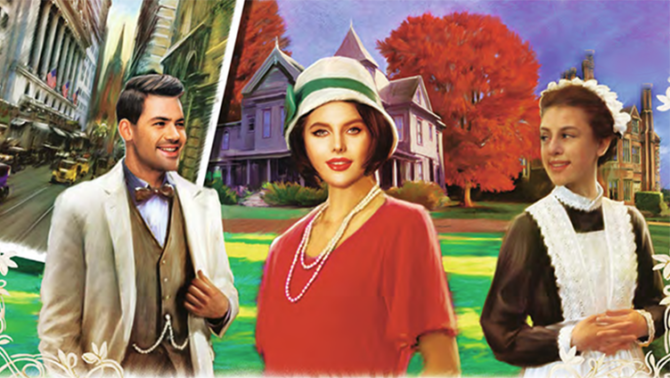
Katie Ashmore
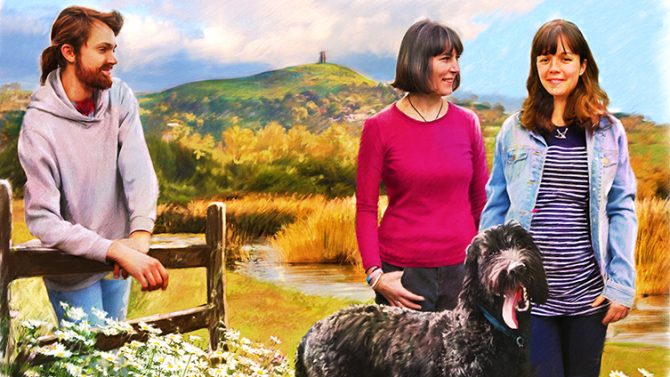
Paula Williams
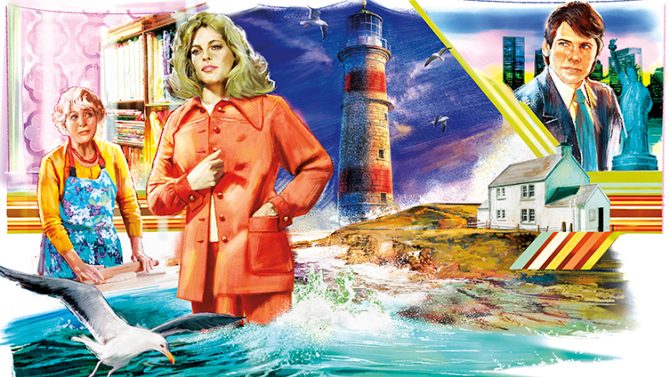
Deborah Siepmann
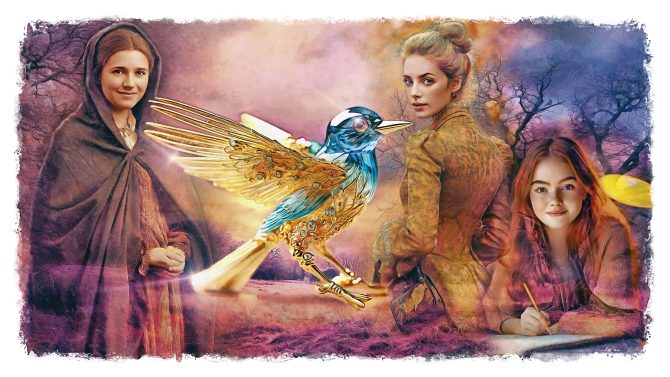

Alison Carter


Teresa Ashby

Beth Watson

Alyson Hilbourne

Katie Ashmore

Kate Hogan

Liz Filleul